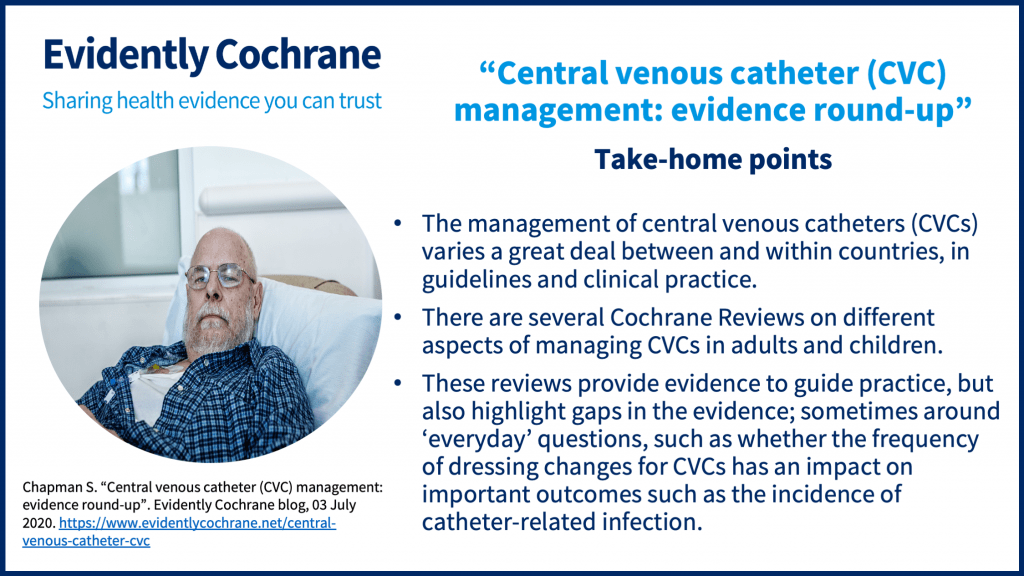The latest evidence and resources for nurses and clinical support workers. You can either scroll through this page or click on any of the links below to jump to the relevant section.
Please note, unlike the rest of our blogs, our Evidence for Nursing: new evidence and resources blogs will not be updated.
COVID-19
Cochrane is producing reviews and resources for the COVID-19 pandemic. We have blogged about many of them and this blog Cochrane evidence on COVID-19: a round-up brings together a large collection of evidence and resources, starting from when this evidence was first being produced in spring 2020. Like the reviews themselves, all our blogs are updated to reflect new evidence.
You may be interested in our blog Personal protective equipment (PPE) for healthcare workers: new Cochrane evidence which discusses the evidence from two Cochrane Reviews and some innovative ideas.
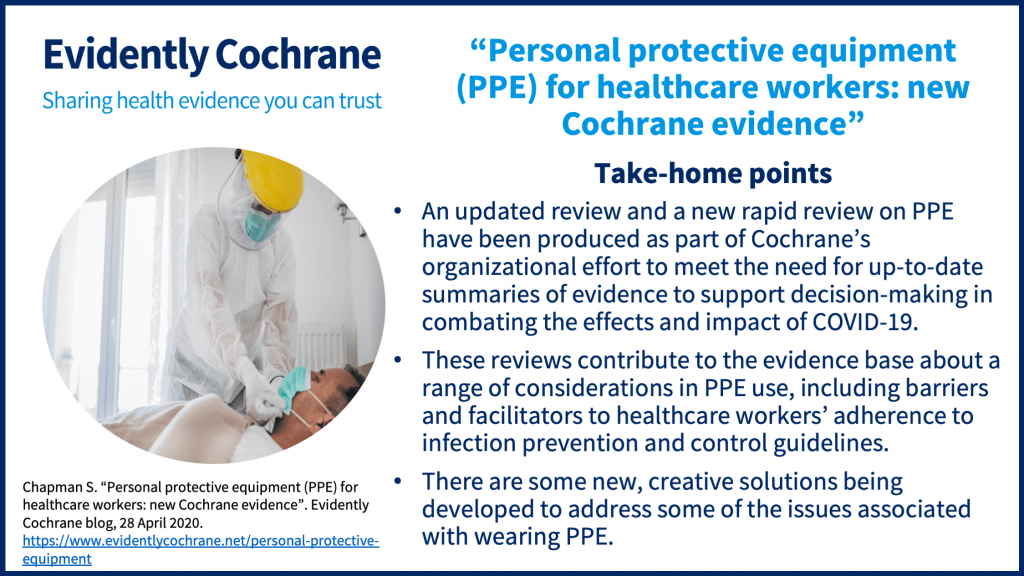
Could antimicrobial mouthwashes and nasal sprays offer protection to healthcare workers, and also patients? Three Cochrane Reviews looked for evidence on this and were published in September 2020. It is disappointing that no completed studies were found, but there are studies underway and these will be considered for future updates of the reviews.
Cochrane Special Collections
Cochrane Special Collections assemble Cochrane Reviews on important topics for the prevention and treatment of COVID-19. They are developed with experts from our global Cochrane network. They are based on World Health Organization interim guidance, and continuously updated.
You can find Coronavirus (COVID-19) Special Collections here.
Cochrane Clinical Answers
Cochrane Clinical Answers (CCAs) provide a readable, digestible, clinically-focused entry point to rigorous research from Cochrane Reviews. They are designed to be actionable and to inform point-of-care decision-making. Each CCA contains a clinical question, a short answer, and data for the outcomes from the Cochrane Review deemed most relevant to practising healthcare professionals. The evidence is displayed in a user-friendly tabulated format that includes narratives, data, and links to graphics.
You can find Cochrane Clinical Answers related to COVID-19 here.
Care of pre-term infants
A Cochrane Review (July, 2020) has looked at Early fortification of human milk versus late fortification to promote growth in preterm infants.
Cochrane Clinical Answers are available for the following questions:
What are the effects of multi‐nutrient fortification of human milk for preterm infants?
In preterm infants, what are the effects of probiotics for preventing necrotizing enterocolitis?
Central venous catheter management
Evidently Cochrane blog for nurses: Central venous catheter (CVC) management: evidence round-up.
Chronic Kidney Disease
Cochrane Clinical Answer: What are the effects of eHealth interventions for people with chronic kidney disease?
Healthcare worker safety and wellbeing
Please see the above section on COVID-19 for evidence on PPE and support for wellbeing in the healthcare workforce.
Minimising workplace aggression
Featured Review: Education and training for preventing and minimizing workplace aggression directed toward healthcare workers.
Fostering resilience
Cochrane Clinical Answer: For healthcare professionals, do psychological interventions help foster resilience?
Older adults and medication-taking ability and adherence
For this recent Cochrane Review Interventions for improving medication‐taking ability and adherence in older adults prescribed multiple medications there is an Evidently Cochrane blog What helps older people take their medication correctly?
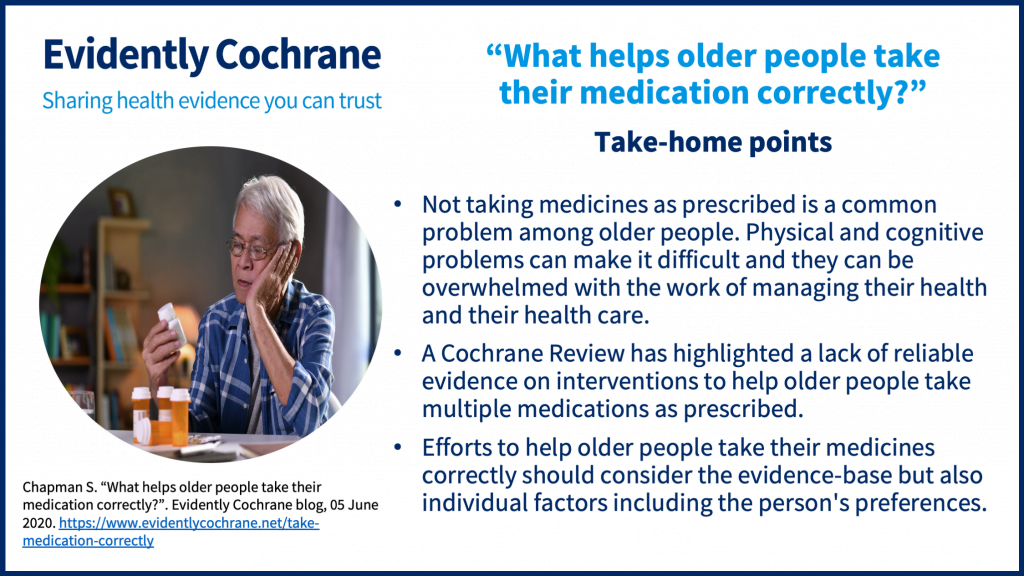
Cochrane podcast: Interventions for helping older adults prescribed multiple medications to use and take their medications
Cochrane Clinical Answer For older adults prescribed multiple medications, do educational and behavioral interventions improve medication‐taking ability and adherence?
Organisation and delivery of care
Patient-initiated appointments
Cochrane Podcast: Patient-initiated appointments for people with chronic conditions managed in hospital outpatient settings.
mHealth-based technologies
mHealth‐based technology aims to provide health care and health education via mobile and wireless technologies.
Primary healthcare services
Cochrane Podcast: Health workers’ perceptions and experiences of using mHealth technologies to deliver primary healthcare services: a qualitative evidence synthesis.
Cochrane Clinical Answer: What are health workers’ perceptions and experiences of using mHealth technologies to deliver primary healthcare services?
mHealth-delivered education for people with heart failure
Cochrane Clinical Answer: For people with heart failure, what are the effects of mHealth‐delivered education?
Respiratory health
Acute respiratory distress syndrome
Featured Review: Oxygen therapy in adult intensive care patients with acute respiratory distress syndrome.
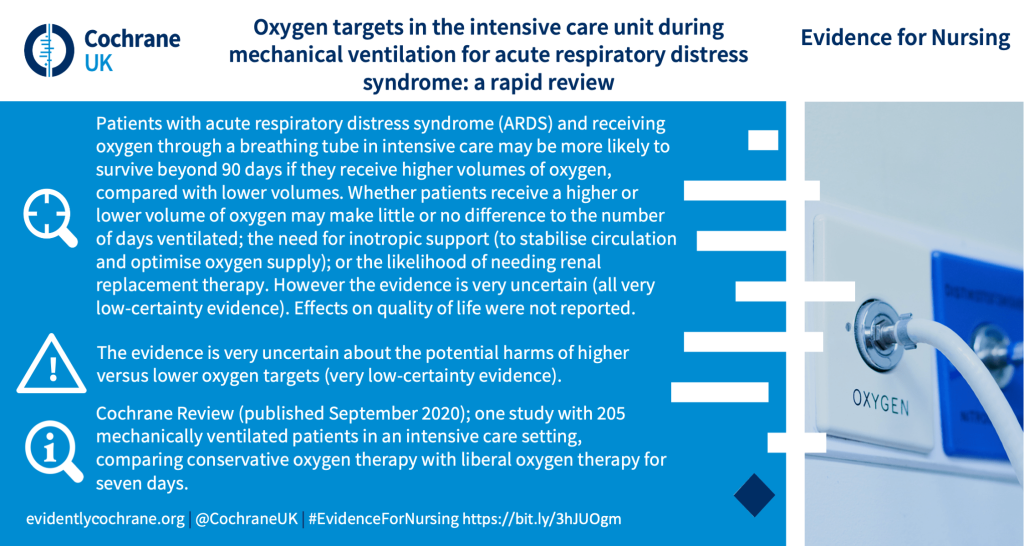
Cochrane Clinical Answer: For people with acute respiratory distress syndrome (ARDS) requiring mechanical ventilation, how do conservative and liberal oxygen targets compare?
Asthma
Featured Review: Interventions for acute severe asthma attacks in children: an overview of Cochrane Reviews.
COPD
Cochrane Clinical Answer: Do smart technology interventions facilitate self‐management for people with chronic obstructive pulmonary disease (COPD)?
Stroke
Cochrane Clinical Answer: What are the effects of psychological interventions for preventing depression after stroke?
We have a blog on Living and dying well after stroke in which Scott Murray and Marilyn Kendall talk about the rich evidence from their in-depth interviews, which could guide provision of person-centred care after major stroke and support people in living and dying well. Many people have left comments below the blog, sharing their own experiences, and both the blog and the comments have valuable insights. Several stroke survivors have written or contributed to other Evidently Cochrane blogs. All our blogs on stroke are here.
Women’s health
Interventions for heavy menstrual bleeding
Pandemics disrupt healthcare provision and, with this in mind, a Cochrane overview of reviews (July 2020) has been done on interventions commonly available during pandemics for heavy menstrual bleeding. You can see summaries of the review here, including an infographic to help women make choices about treatment. There is also a podcast about this review and two Cochrane Clinical Answers.
Coming up…
The first World Evidence Based Healthcare Day will take place on 20 October 2020. This is an initiative launched by Cochrane and six other leaders in the field, to create awareness of the need for better evidence to inform healthcare policy, practice and decision making in order to improve health outcomes globally.
You can find information and resources on the World Evidence Based Healthcare Day website and look out for content on social media #WorldEBHCDay #EvidencetoImpact.
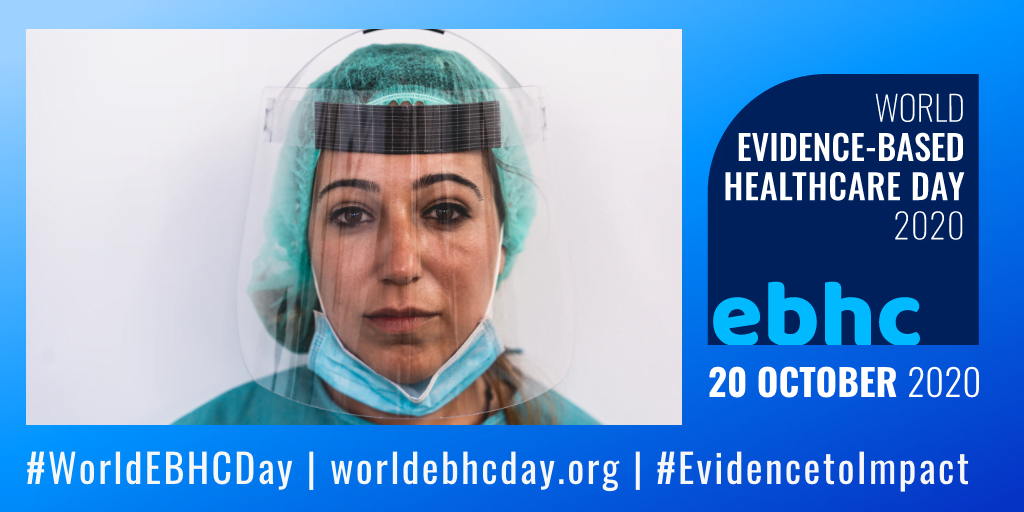
The next collection of evidence will be published here in January 2021. We may have new blogs and blogshots on individual reviews meanwhile. You can find all our blogs relevant to nursing here and blogshots here.
Join in the conversation on Twitter with @CochraneUK or leave a comment on the blog. Please note, we will not publish comments that link to commercial sites or appear to endorse commercial products. We welcome diverse views and encourage discussion but ask that comments are respectful and reserve the right to not publish comments we consider offensive.


